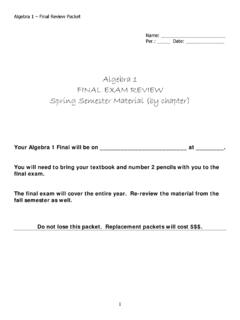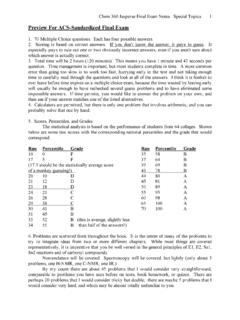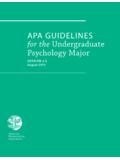Transcription of CHEMISTRY 1210 General Chemistry I Syllabus Course …
1 CHEMISTRY 1210 General CHEMISTRY I Syllabus Course Description CHEMISTRY 1210 is a four-credit Course that consists of three lectures (section 001) per week. CHEMISTRY 1215. is the companion one-credit lab Course . CHEMISTRY 1215 meets one three-hour period per week. CHEM. 1210/1215 are General CHEMISTRY courses that are comparable to any science majors' sequence taught at major state universities in the United States. As a student, you are expected to perform at a level that is commensurate with students from other institutions such as Pennsylvania State University, University of Arizona, University of Wisconsin-Madison, and University of California-Berkeley. We expect excellence from you as well as from ourselves. Instructor Jeff Statler North Henry Eyring CHEMISTRY Building (NHEB or simply HEB) 1011. MWF Lecture 10:00-11:30 AM HEB 2008. TH Office Hours 9:00-10:30 AM HEB 1011.
2 801-581-7288. Assistant Connie Gorton HEB 2170 (801)581-5074. Required Materials CHEMISTRY AN ATOMS FIRST APPROACH: First Edition, Zumdahl and Zumdahl, CENGAGE Learning, 2012. Turning Technologies PRS Clicker Survival Guide for General CHEMISTRY with Math Review and Proficiency Questions, 2nd Edition A scientific calculator capable of log/exponential functions and scientific notation. PROGRAMMABLE. CALCULATORS OR OTHER ELECTRONIC DEVICES CAPABLE OF STORING ALPHANUMERIC. DATA ARE NOT ALLOWED FOR USE ON EXAMS. TI-30 calculators which sell for ~ $12 are appropriate and available in the University Bookstore. Final Grades Final grades in CHEM 1210 will be calculated on the following basis. Assignment % per assignment Total % of final grade Two midterm exams 15% 30%. Final exam 30% 30%. Homework # correct/total number 20%. Lecture Clicker Exercises # correct/total number 20%.
3 100%. Discussion section participation # correct/total number Up to 5% extra credit Final grades will be assigned on the following basis: A > B+ C+ A- B C D B- C- E < FINAL GRADES IN CHEM 1220 WILL NOT BE CURVED AT THE END OF THE SEMESTER. Final grades are not posted to Canvas nor will your instructor provide you with that information. All students can access their grades via the PeopleSoft system once they are posted and released by the Registrars Office. Course Policies: General CHEM 1210 and 1215 should be taken concurrently. CHEM 1215 is an independent and separate Course from CHEM 1210. Your grade in CHEM 1210 is not averaged with your CHEM 1215 grade nor vice versa. CHEM 1215 is required for most majors that require CHEM 1210. The University of Utah seeks to provide equal access to its programs, services and activities for people with disabilities. If you will need accommodations in the class, reasonable prior notice needs to be given to the Center for Disability Services, 162 Olpin Union Building, 581-5020.
4 CDS will work with you and the instructor to make arrangements for accommodations. All written information in this Course can be made available in alternative format with prior notification to the Center for Disability Services. Assignments The following Chapters will be covered in CHEM 1210. Review Chapter Measurement & Calculations Chapter 1 Chemical Foundations Chapter 2 Atomic Structure and Periodicity Chapter 3 Atoms to Molecules Chapter 4 Bonding: General Concepts Chapter 5 Molecular Structures & Orbitals Chapter 6 Chemical Energy Chapter 7 Gasses Chapter 8 Liquids & Solids (briefly). Chapter 9 Stoichiometry Chapter 10 Types of Chemical Reactions & Solution Stoichiometry It is a good idea to work numerous problems in the back of the chapters. This will improve your familiarity with the material. Attendance Attendance is mandatory in CHEM 1210 however no attendance records are kept.
5 Clicker responses will be some indication of your attendance/participation. It is strongly recommended that you attend class since students who show up for lectures do better in the class. You should schedule all activities such as advising appointments, preregistration, Regents Examinations, etc. early in the semester so that they do not interfere with regularly scheduled assignments or labs. Such absences are not excused. Assignments or labs missed because of participation in officially scheduled University of Utah functions will be considered as excused absences. Typically this means that we will average your other scores for the missed assignment and substitute the average score. A written statement by the sponsoring University of Utah faculty member, on University Department letterhead, must be submitted to your instructor one week prior to the function to receive an excused absence.
6 This does not include club sports sponsored by Associated Students of the University of Utah. You are responsible for announcements made at the beginning of Lecture! Absence from class does not relieve you of this responsibility. Discussion Sessions: CHEM 1210 students must be registered in a Discussion Section. The first discussion sections will be held on Wednesday, May 15th and Thursday, May 16th. Learning to solve problems in General CHEMISTRY is the focus of the discussions, which are led by a teaching assistant (TA). Discussions are not meant to be repetitions of the class lectures, and in some cases will present material that your lecturer does not cover in class. Your TA's primary job is to help you solve chemical problems. You will get far more out of discussion if you try to solve the problem sets before each session. The problems solved during discussion sections are designed to help you improve your problem solving skills.
7 They also provide up to 5% extra credit for this Course . Your responses to these problems will be collected through the Clicker Response devices. If you have any complaints about your TA, bring them to your class instructor (Mr. Statler) and he will speak to the TA. about the issue without revealing your identity. Tutoring Room The CHEMISTRY Department has a tutoring area in room 1316 of the CHEMISTRY Building. It is open and available to you from 8:00 AM to 5:00 or 6:00 PM on Monday to Friday. Each General CHEMISTRY TA is required to spend at least 2 hours per week there. We will post a schedule for you in the room as soon as the times are assigned. This is the perfect time and place for you to get one-on-one tutoring from one of our TA's. Please take advantage of this opportunity. Supplemental Instruction The Supplemental Instruction Program, called SI for short, is offered in this Course to provide organized study sessions.
8 These sessions are free and open to all students in the Course and are led by an undergraduate who has done well in this subject area. Your SI leader will be attending classes, reading the material, and doing any relevant assignments to be prepared for the SI sessions. The purpose of SI is to see that each of you has the opportunity to do as well as you would like to in this Course . In SI sessions, we will review, organize, and clarify the material from lectures; teach you ways to develop effective study skills for this Course ; and help you prepare for exams. Your SI leader will schedule 2 or 3. meetings per week convenient to the majority of your schedules. Attendance is voluntary, and you may attend as many or as few sessions as you like. Homework Homework problem sets are assigned at least 24 hours prior to each class, and are to be completed online using OWL. Completing these assignments is an important part of ensuring your success in the Course .
9 Experience with prior classes shows that if you score at least 80% on the OWL assignments you will have a very high probability of passing the Course . Instructions for registering yourself into the OWL system are given in the packet contained in your textbook purchase. Please follow those instructions. Late homework submissions will not be counted. Lecture (in-class) clicker exercises In class clicker exercises will be administered in class using the Turning Point Technologies PRS clicker system. Only students who attend that day's lecture in their assigned lecture section and have their registered and operable PRS. clickers are entitled to participate. There will be no makeup in class exercises administered. Any students who bring extra clickers to class to answer for their associates are in violation of the University's Academic Honesty code. All students who participate in this activity will receive an E for the Course .
10 During each class session clicker exercises will be given that are designed to reinforce and expand your knowledge of the subjects being studied that day. Students will work in groups to answer these questions. Only correct answers will receive credit. There are no participation points.. At the end of the semester, 20% of your average accumulated clicker points will be included as your in class clicker exercise score for CHEM 1210. It is your responsibility to correctly register your clicker identification through the University of Utah Canvas system associated with this Course . If you do not register correctly, your UID and name will not be associated with your clicker and you will not receive credit for your clicker exercises. At the start of the semester, one noncredit clicker exercise will be given so that everyone has a chance to see if their clicker is working and that they have correctly registered through Canvas.





